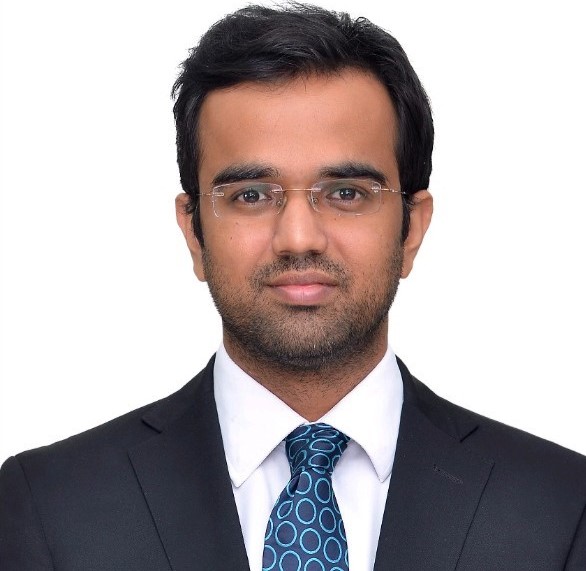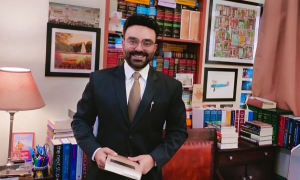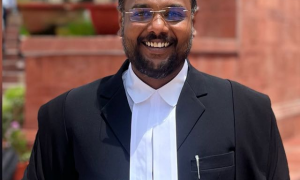This Interview has been published by Pragya Chandni and The SuperLawyer Team

Can you share with us what initially sparked your interest in pursuing a career in law, particularly specializing in indirect tax litigation and international trade policies?
My father and his brother both practice as Sales Tax Consultants in the city of Mangalore. Back in the early 2000’s, their work involved a lot of attendant work such as visiting the Sales Tax Department for filing monthly returns and yearly assessments etc. Nothing was online then, so when I was at school, I used to visit them during these rituals to assist. However, it was more for the customary lunch at a hotel that followed.
When I was studying at college for my degree in commerce, I got more involved in the work. This allowed me to get to know about the legal proceedings that follow, such as issuance of proposition notices, appeals and tribunal proceedings etc. For this we would rely on advocates at Bangalore, which sparked my interest in indirect tax litigation and so I ended up studying law.
With your extensive experience in handling cases across various sectors like oil and gas, telecommunication, banking, and more, what motivated you to focus on these specific areas within the legal field?
Taxation is a very niche area of practice. So once you decide to pursue a career in it, you have to deal with a variety of cases relating to different sectors. It also depends on the place where one practices. For example, at Bangalore you may find more service tax litigations because of the place primarily being an IT hub. Whereas, when it comes to excise and customs, it is Mumbai and Gujarat because of the large manufacturing industries, customs ports and corporate offices of leading companies being located here. So bigger cities have their own advantages.
Could you walk us through your journey from your early days as a law student to your current role as an Associate Partner at TLC Legal, one of India’s leading law firms in indirect taxes and international trade policies?
I did my law at SDM Law College, Mangalore. After I completed my law, I joined the law chambers of Mr.K.S.Ravi Shankar, Senior Advocate at Bangalore who practices at the High Court of Karnataka, in the areas of Indirect Taxation.
Then when I moved to Mumbai, I got the opportunity of working as an associate at TLC Legal, which specialises in indirect tax litigation and advisory. Working at TLC Legal has been very fulfilling as I had the opportunity of working on some of the interesting as well as complex cases. I got the opportunity to work with some of the best legal minds of the country.
You’ve had the opportunity to work with esteemed legal practitioners such as Mr. K.S. Ravi Shankar. How did these experiences shape your approach to legal practice and influence your career trajectory?
I had the fortune of working at the law chambers of Mr.K.S.Ravi Shankar, who is not only a distinguished lawyer but also a revered scholar on vedas and other scriptures. He is an exceedingly well read man, bestowed with great skills of advocacy. His chamber had good work in indirect taxation that immensely helped me build my interest in the subject. Working with him taught me how to be disciplined at work (he would begin his day in the office at 7 in the morning!), which to a large extent I try to practice. His one piece of advice to me, which I still vividly remember, is to cultivate the habit of reading, and that I should spend 10% of what I earn on buying books.
As someone who regularly appears before the Supreme Court, High Courts, and Tax Tribunals, what are some of the unique challenges you face in representing clients in complex indirect tax cases?
Taxation as such is not a very interesting subject, and I have been told this by many. It can be humdrum particularly with cases that involve too many numbers. A lawyer needs to sit with the client or his accountant and understand it clearly. This is where knowing a bit of basic accounting and reading financial statements would come in handy.
But the real challenge is presenting the case before a Judge. Some of them are extremely patient, some are quick tempered, some are very vocal – they keep asking questions, and they will not move an inch further till they are satisfied. Therefore, I follow the rule of reading the brief thoroughly from the first page to the last, as you never know how things go on in the Court.
One thing I learnt from my senior Mr.Vipin Jain is to think about how to make the case interesting for a judge. One way of doing this can be by giving real life examples – even abstruse questions can be explained interestingly with simple examples and anecdotes.
Can you share some insights into your approach to drafting appeals, petitions, and providing legal opinions under GST/indirect tax laws? How do you ensure accuracy and effectiveness in your legal arguments?
Drafting is an art and one needs to put in conscious efforts to improve this. My approach has always been not to be too verbose in appeals and petitions, but brief and concise. I don’t find any point in making long written arguments or citing several case laws.
One part which I take utmost care while drafting an appeal or petition is the drafting of synopsis and the dates and events. Synopsis is the soul of any petition or appeal, and sometimes the judges skim through it to understand the case before coming to the Court. Preparing a two or three page succinct synopsis helps organise and put the thoughts onto paper for whatever may be the complexity of the matter. This would also help recollect the matter for when it is revisited after several years down the line.
Each case mainly has one or two arguments on which the entire case hinges, rest are all mainly fillers. So to ensure accuracy and effectiveness in the arguments, I mainly focus on these and try developing it more and in a better way.
With your background in international business, trade, and tax law, how do you stay updated with the evolving landscape of indirect taxes and international trade policies, and how does this knowledge benefit your clients?
Yes, it is important to stay abreast in the legal profession. For this I read mails sent by a few subscriptions which track these developments.
Finally, what advice would you offer to law graduates who aspire to specialize in indirect tax litigation and international trade policies, based on your own experiences and insights gained throughout your career journey?
I always believe in “each to their own”, meaning what worked for me, may not work for others. But since you have asked this, here are a few points that I can think about:
- Focus on communicating effectively. Lawyers always communicate, either written or oral. You may know your facts and the law well, but you can’t make an impact unless you are able to communicate effectively. Reading helps with this.
- Make use of online resources. Today many courts are live streaming on YouTube. There are other YouTube channels as well, like the Justice Nariman Official Channel, which is immensely resourceful. Listening to these would help understand how great legal minds work.
Get in touch with Ramnath Prabhu-

























